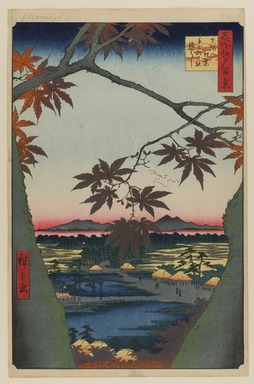
Artist:Utagawa Hiroshige
Medium: Woodblock print
Geograhical Locations:
Dates:1st month of 1857
Dimensions: Sheet: 14 3/16 x 9 1/4 in. (36 x 23.5 cm) Image: 13 3/8 x 8 3/4 in. (34 x 22.2 cm)
Collections:
Exhibitions:
Accession Number: 30.1478.94
Image: 30.1478.94_PS20.jpg,
Catalogue Description: Mama was over ten miles east of central Edo, on the far side of the Edogawa River in the present city of Ichikawa, Chiba Prefecture. It was known for the beauty of its autumn maples, their glorious orange color here unfortunately blackened with age (see print 88 for a discussion of the ink pigment). Beyond the maple trees lay the shrine and bridge mentioned in the title, which enjoyed a life of their own in Japanese literature. The literary fame of Mama dates back to Japan's first great poetry anthology, the Man'yoshu, particularly to the tale of Tekona, the beautiful country maid who was so harassed by suitors that she threw herself into the waters of Mama in desperation. In 1501, the seventh abbot of Guhoji consecrated the small shrine to Tekona that Hiroshige has depicted here to the lower left, partly hidden by the tree trunk. The shrine had progressed in Hiroshige's time from a literary to a religious landmark. The worship of Tekona was believed to aid in childbirth and in the cure of chickenpox. The shrine survives today, although the surrounding area is now densely settled. In the center of the print, beyond the Tekona Shrine, is another legacy of the Man'yoshu, the Linked Bridge of Mama, over which one of Tekona's suitors came to woo her. The forms of the distant mountains shown here are those of Mount Tsukuba.